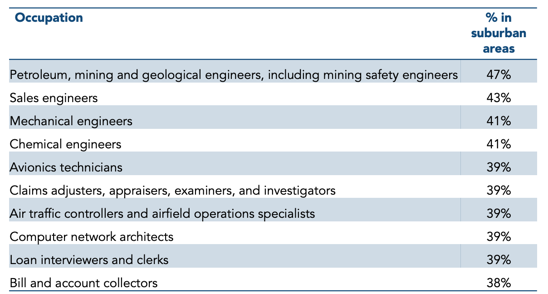Connecting state and local government leaders
New labor data show that the suburbs have the fastest job growth in the U.S. But we shouldn’t assume the future of employment will be suburban.
Suburbs are increasingly not just where Americans live, but where they work. According to the U.S. Bureau of Labor Statistics’ Quarterly Census of Employment and Wages, 32 percent of U.S. employment is in the suburbs of large metropolitan areas—that is, in the medium- and lower-density counties within metropolitan areas that contain at least 1 million people. That is on par with the 32 percent of the population that lives in the suburbs of these metros. (A slight majority of Americans lives in suburbs overall, but this analysis looks specifically at suburbs of large metros.)
The latest BLS data show that job growth, like population growth, is faster in these suburbs than in urban counties, smaller metros, and non-metropolitan areas.

However, the jobs of the suburbs look different from city jobs. The urban revival that has drawn new residents into city neighborhoods—although overstated—has also affected where people work.
To see this, let’s start by looking closely at the kinds of jobs found in the suburbs. Naturally, with a large share of the population, the suburbs have a large share of jobs that tend to be found wherever people live. These “everywhere jobs” include retail sales roles, elementary and middle school teachers, hairdressers, and many other occupations that serve customers face to face.
Rural areas and smaller metros have the lion’s share of jobs requiring lots of land or needing proximity to natural resources, like logging workers, farmers, and mining machine operators. Urban counties have their own mix, too, with a majority of actors, producers, and directors; disproportionately high shares of economists and financial analysts; and many workers serving urban residents and visitors, such as taxi drivers and hotel employees.
But what about jobs that are distinctly prevalent in suburbs? These are a bit harder to guess. Engineering jobs are most disproportionately clustered in suburban locations. For instance, 47 percent of petroleum, mining, and geological engineers are in suburbia, compared with 31 percent of employment overall. Sales, mechanical, and chemical engineers are also unusually prevalent in the suburbs. So are several operational occupations in finance and insurance, like claims adjusters, loan interviewers, and bill collectors.

What do these particularly suburban jobs have in common? To hire specialized engineers, it’s a plus to be in a big labor market—but their jobs often require machinery or equipment that needs too much space to justify a high-rent central city location. The financial and insurance occupations benefit from being in a large market with lots of customers, but probably can’t outbid better-paid analysts or lawyers for downtown space. In short, these suburban jobs get access to the large local economy without paying downtown office prices.
Even though we can point to jobs that cluster in the suburbs, the suburbs have a mix of jobs that look more like the economy overall than the mix in either urban counties or smaller metros and rural areas does. In other words, the most suburban jobs are less exclusively suburban than the most urban jobs (actors, economists) are urban, or than predominantly small town and rural jobs are typical of job markets there.
With this information on job composition in mind, let’s take a closer look at job growth in the suburbs. How does employment growth in the suburbs square with reports of headquarters moving back downtown and young people attracting jobs back to the city?
There are three reasons why faster job growth in the suburbs isn’t the whole story.
First, urban jobs pay more—and average wages are rising fastest in urban counties. Better-paying jobs sort into urban locations, and increasingly so. Average wages per worker in urban counties are 26 percent above those in the higher-density suburbs of the same large metros and 46 percent above lower-density suburbs.
These employment patterns are similar to residential patterns, which show that population growth may be faster in suburbs, but urban areas are gaining in higher-income households. For jobs, as well as for people, the urban revival is more about a compositional shift than faster growth.


Second, the future of work may favor urban areas. Based on the latest BLS occupational projections through 2028 and current job-location patterns, urban counties have the mix of jobs projected to grow fastest. Suburbs may have lots of jobs in some fast-growing services, but they also have a disproportionate share of operational occupations in finance and insurance that are projected to shrink.
Of course, having jobs in faster-growing occupations doesn’t guarantee that urban counties will have the fastest job growth. Constraints and costs also affect where jobs go, and lower-cost suburbs might lure some jobs in occupations that have traditionally located in central urban areas.

Third: the urban revival in job growth is more of a catching up than a pulling ahead. Taking the long view, suburban job growth has outpaced urban job growth for decades. But the gap has narrowed since the recession of the late 2000s, and urban jobs rebounded in tandem with the suburbs’ jobs. That’s in contrast to much of the period prior to the recession, when job growth in cities often lagged behind even non-metropolitan areas.
Since employment projections favor cities, the job-growth gap between suburban and urban counties might remain narrow—although the widening gap between large metros and the rest of the country might persist.
More important, the long view also reveals that urban counties, suburbs, smaller metros, and rural areas tend to move together. They all do better in booms and suffer in recessions. In most years, the differences in job growth between urban counties, suburbs, and other areas are small, relative to how the ups and downs in the economy affect job growth in all types of places. Suburbs do better when the overall economy does; the same goes for cities and rural areas. Despite the debates over the urban revival and suburban growth, we’re all in it together.
Jed Kolko is chief economist at Indeed.

NEXT STORY: Why the 21st-Century Economy Prizes Overwork



